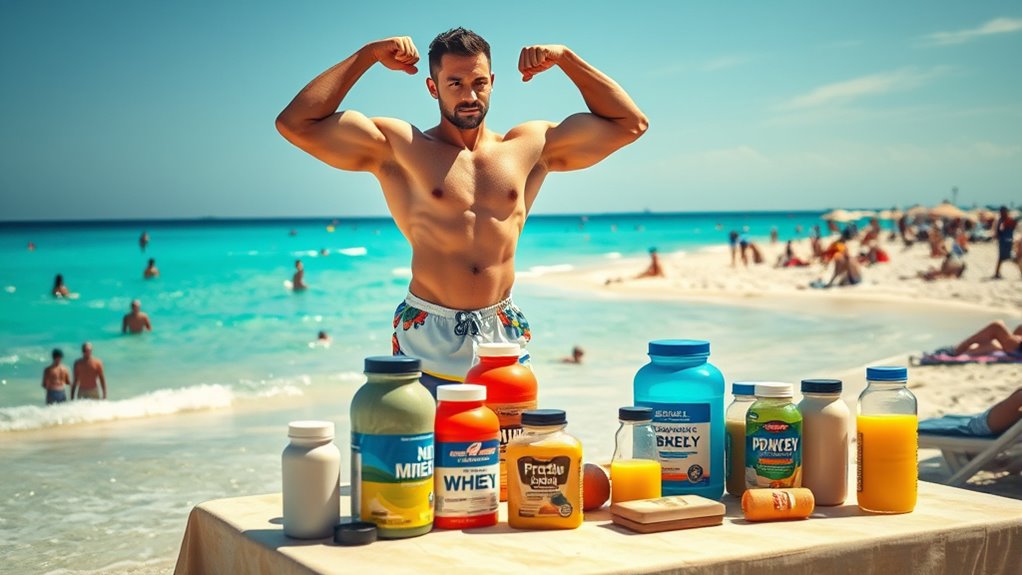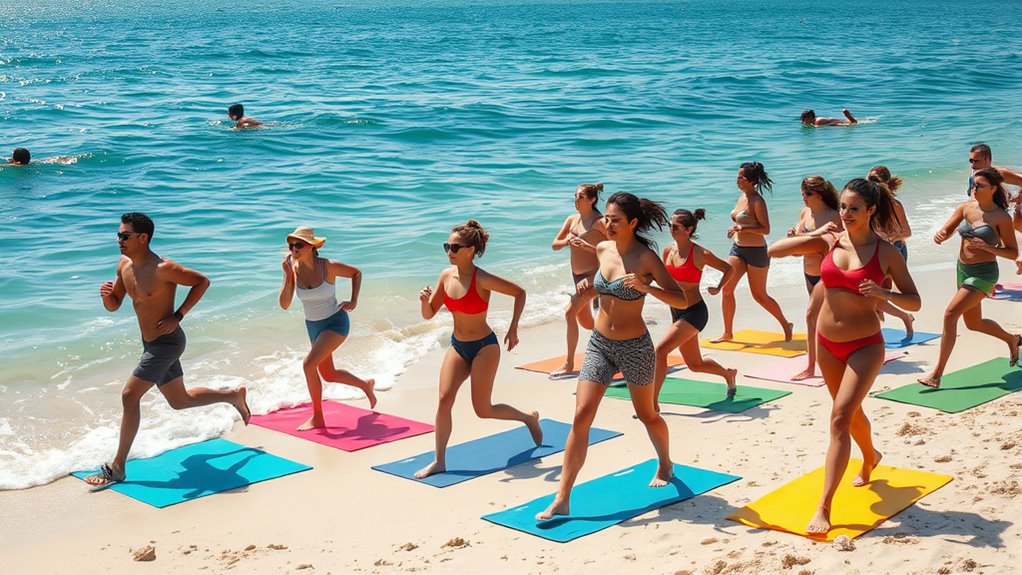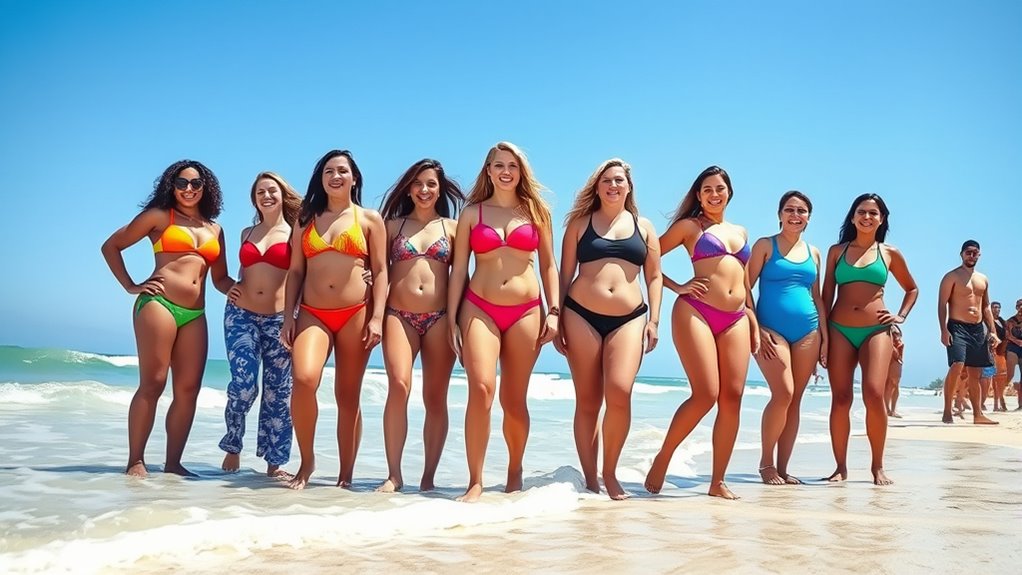Many myths about achieving a beach body can mislead you. Spot reduction doesn’t work, so targeting specific areas won’t burn fat there. Carbs aren’t the enemy, and extreme diets aren’t sustainable. Rest days and varied workouts are vital for progress. Supplements won’t replace a balanced diet, and tanning isn’t a health indicator. Achieving your goal takes time, effort, and smart habits—if you want to know how to separate facts from fiction, keep exploring.
Key Takeaways
- Spot reduction is a myth; overall fat loss through full-body exercise and proper nutrition is necessary for a leaner appearance.
- Carbohydrates support energy and recovery; not all carbs hinder fat loss—choose complex, nutrient-dense sources.
- Quick fixes and extreme diets rarely lead to sustainable results; gradual, balanced habits promote long-term health.
- Rest days are essential; over-exercising without recovery can hinder progress and increase injury risk.
- A “perfect” body is a myth; focus on personalized goals and body acceptance instead of striving for a universal ideal.
The Myth of Spot Reduction

Many people believe they can target fat loss in specific areas by doing exercises focused on those spots, but this is a myth. Spot reduction, or targeted fat loss, is a common misconception. The idea that doing crunches will melt belly fat or leg lifts will slim thighs doesn’t hold up. Your body burns fat more generally, not just in the muscles you work out. When you exercise, your body pulls energy from fat stores across your entire body, not just one targeted area. Achieving a leaner look requires overall fat loss through consistent exercise and proper nutrition, rather than spot-specific workouts. Focus on full-body activities and balanced eating instead of targeting particular areas for fat loss. Holistic approach principles highlight the importance of comprehensive strategies and clear communication, which can be applied to understanding how your body responds to exercise and nutrition. Additionally, understanding fat loss mechanisms helps set realistic expectations and guides effective fitness routines, emphasizing that body fat distribution varies from person to person and influences visible results. Recognizing the role of personality traits like motivation and consistency can also support long-term success in achieving your fitness goals.
Carbohydrates Are the Enemy for a Beach Body

Many people believe carbs are the main reason they can’t achieve a beach body, but that’s not entirely true. Carbohydrates actually fuel your workouts and help your body recover. Not all carbs are the same—some are beneficial, while others should be limited. Including healthy carbohydrate sources in your diet can support sustained energy levels and overall health. For example, incorporating complex carbs like whole grains and vegetables provides lasting energy without the blood sugar spikes associated with refined carbs. Additionally, understanding juice yield from citrus fruits can help you better plan your nutritional intake, much like choosing the right carbs supports your health goals.
Carbs Fuel Your Workout
Contrary to popular belief, carbs are essential for fueling your workout rather than sabotaging your beach body. When you pay attention to meal timing, carbs can give you the energy boost needed for intense exercise. Eating carbs before exercise ensures your muscles have glycogen, which improves performance and endurance. Carbohydrate intake should be strategic; for example, carb cycling allows you to adjust your intake based on workout days versus rest days, optimizing fat loss without sacrificing energy. Instead of avoiding carbs altogether, focus on timing them right around your workouts. This way, you maximize their benefits and prevent unnecessary fatigue. Remember, carbs are fuel—your body’s primary source of energy during physical activity. Properly timed, they support your fitness goals and help you achieve your beach body. Additionally, understanding how wind turbine blades vary in weight and design highlights the importance of efficiency and proper planning in energy use, which parallels how strategic nutrient timing can optimize your workout results. Incorporating nutrient-rich, high-water-content foods like celery juice can also aid in hydration and recovery, further enhancing your performance. Recognizing how storage impacts freshness and quality underscores the importance of proper planning in your nutrition habits for sustained progress. Being mindful of meal prep can help you stay consistent with your carbohydrate intake and overall diet.
Not All Carbohydrates Equal
Are all carbohydrates created equal when it comes to achieving your beach body? Not exactly. Complex carbs, like whole grains, vegetables, and legumes, digest slowly and provide sustained energy, helping you stay full longer. They also help regulate blood sugar levels, reducing cravings. Simple carbs, found in sugary snacks, white bread, and soda, digest quickly, causing spikes in blood sugar and insulin. This rapid energy boost is often followed by a crash, leading to increased hunger and overeating. To optimize fat loss and muscle definition, focus on eating more complex carbs and cutting back on simple carbs. This shift supports steady energy, better digestion, and improved overall body composition. Remember, not all carbs are your enemy—choose wisely to fuel your beach body goals.
Extreme Diets Lead to Lasting Results

While extreme diets promise rapid weight loss, they rarely deliver lasting results. Many turn to methods like detox diets or intermittent fasting, hoping for quick fixes. However, these approaches often lead to temporary weight loss rather than sustainable change. Detox diets may help eliminate toxins temporarily, but they lack long-term effects and can cause nutrient deficiencies. Intermittent fasting can be effective for some, but if you rely solely on it without making broader lifestyle changes, the results won’t stick. Extreme diets often cut calories drastically or eliminate entire food groups, making them difficult to maintain. Instead, focus on balanced eating habits you can sustain long-term. Incorporating balanced nutrition concepts like community engagement and sustainability can inspire more holistic health and wellness approaches. Additionally, understanding aura variations can promote better self-awareness and emotional well-being, supporting your health journey. Lasting results come from consistent, moderate adjustments—not quick, extreme measures that are hard to maintain.
You Need to Exercise Every Day to See Progress

Many people believe that exercising every day is necessary to see noticeable progress, but that’s not entirely true. Your body needs rest days to recover and prevent injury, so skipping them can hinder your results. Incorporating workout variety is more effective than daily repetition, as it targets different muscle groups and keeps you motivated. Rest days allow muscles to repair and grow stronger, making your workouts more productive over time. Additionally, understanding somatic therapy techniques can help you create engaging audio cues that motivate and guide your fitness journey. Incorporating modern fitness technology can also enhance your workout experience and track your progress more accurately. Using yoga practices can improve flexibility, mental clarity, and overall well-being, complementing your fitness routine. Scheduling recovery periods thoughtfully into your routine supports sustainable progress and reduces the risk of overtraining. Instead of working out every day, aim for a balanced routine with scheduled rest days. This approach helps avoid burnout and reduces the risk of overtraining. Remember, quality workouts with proper recovery often lead to better results than simply working out every single day. Your progress depends on consistency, variety, and rest.
Supplements Can Replace a Balanced Diet

Supplements might seem like an easy shortcut to meeting your nutritional needs, but they can’t replace the benefits of a balanced diet. Relying solely on protein supplements or diet replacements misses out on essential nutrients found in whole foods, like fiber, vitamins, and minerals. While protein supplements can support muscle recovery, they shouldn’t be your main source of nutrition. Whole foods provide a complex mix of nutrients that work together to keep you healthy and energized. Diet replacements may help in specific situations, but they lack the variety needed for long-term wellness. Remember, no supplement can replicate the full spectrum of nutrients and benefits that come from eating a diverse, balanced diet. Additionally, Jet Boat ensure your browsing experience remains smooth and secure while you focus on your health journey. For optimal indoor air quality, choosing the right air purifier can support your overall health and wellness. Focus on real foods for sustainable health and a true beach-ready body.
The Perfect Body Is the Same for Everyone

The idea of a single “perfect” body for everyone is a myth. Your body is unique, and what works for one person might not suit another. Instead of trying to fit into someone else’s standard, focus on personalized goals that reflect your individual needs and preferences. This approach boosts your body confidence and helps you appreciate your natural shape.
Your body is unique—embrace it and set personalized goals for confidence and happiness.
Here are three key points to remember:
- Embrace your body’s diversity and avoid comparing it to others.
- Set realistic, personalized goals that align with your lifestyle.
- Celebrate progress over perfection to maintain motivation.
Skin Tanning Is a Sign of Good Health

Many believe that a darker tan indicates good health, but in reality, it’s a sign your skin has been damaged by UV rays. Melanin gives your skin color, but relying on a tan as a health indicator ignores the risks involved. Instead, focus on other signs of well-being that don’t compromise your skin’s safety.
Tanning Risks and Realities
While a tan might seem like a sign of good health, it actually masks serious risks to your skin. Tanning exposes you to UV dangers that can cause premature aging and skin cancer. Instead of risking UV damage, consider sunless tanning options for a safe glow. Here are some key facts:
- UV rays damage your skin’s DNA, increasing skin cancer risk.
- Sunless tanning products, like sprays and lotions, provide color without UV exposure.
- A real tan doesn’t mean healthy skin — it’s a sign of skin injury and aging.
Melanin’s Role in Skin
Understanding how your skin responds to sun exposure involves more than just avoiding damage; it’s also about the role of melanin. Melanin protection is essential because it determines your skin’s pigmentation, offering natural defense against ultraviolet rays. When you spend time in the sun, your skin produces more melanin to shield deeper layers, which results in a tan. This process isn’t just about aesthetics; it’s your body’s way of signaling increased protection. People with darker skin naturally have higher melanin levels, providing better defense against sunburns and skin damage. However, a tan shouldn’t be mistaken for health; it’s an adaptation that indicates your skin is working to protect itself. Understanding melanin’s role helps you appreciate why skin pigmentation varies and how it influences your response to sun exposure.
Health Indicators Beyond Color
A tan is often seen as a sign of good health, but it’s important to recognize that skin color alone doesn’t tell the full story. True indicators of skin health go beyond superficial color. Here are key signs to watch for:
- Even Skin Tone – Healthy skin appears uniform, without blotches or discoloration, indicating good hydration and minimal damage.
- Elasticity and Firmness – Skin that bounces back when pinched suggests proper hydration and collagen health.
- Absence of Flakiness or Dryness – Smooth, supple skin points to adequate hydration and proper skin barrier function.
Focusing on these signs helps you assess overall skin health more accurately than just relying on a tan or color, which can be misleading and sometimes harmful.
Cardio Is the Only Way to Burn Fat

Many people believe that cardio is the only effective way to burn fat, but this isn’t entirely true. While cardio, like running or cycling, does promote fat burning, it’s not the sole method. Incorporating interval training can boost your fat-burning efforts by alternating high and low-intensity exercises, keeping your body engaged and maximizing calorie burn in less time. Resistance training also plays an essential role, helping you build muscle, which increases your resting metabolic rate and enhances fat loss over time. Relying solely on cardio may limit your progress and overlook other effective strategies. Combining various workout types creates a balanced approach that accelerates fat burning, improves fitness, and prevents plateaus. Remember, a thorough plan beats just doing endless cardio every time.
Weight Loss Is the Only Goal for Summer

Many people think summer is only about losing weight, but focusing solely on that can be limiting. Instead, prioritize your overall health and mental well-being, which are just as important. Embracing body diversity helps you enjoy the season without pressure or unrealistic standards.
Focus on Overall Health
While weight loss often dominates summer body goals, focusing solely on shedding pounds can overlook the importance of overall health. Prioritizing your well-being leads to sustainable habits and improved vitality. To do this, consider these key steps:
- Practice mindful eating to better recognize hunger cues and enjoy your food more.
- Manage stress through activities like meditation or exercise, which support mental and physical health.
- Incorporate balanced, nutrient-rich meals that nourish your body, rather than just calorie counting.
Focusing on overall health encourages a positive relationship with your body, reduces the pressure to achieve a perfect summer look, and promotes long-term wellness beyond the season. Remember, a healthy body is the best beach body.
Embrace Body Diversity
Focusing solely on achieving a specific body type for summer can narrow your perspective and overlook the beauty of diverse shapes and sizes. Embracing body diversity means recognizing that all bodies are unique and valuable, regardless of societal standards. Prioritizing body positivity and self-acceptance helps you appreciate your body for what it can do, not just how it looks. This mindset encourages confidence and happiness, rather than stress over weight loss or fitting an ideal. Remember, a healthy summer isn’t about conforming to a certain image but celebrating your individuality. When you accept your body, you foster a positive relationship with yourself and inspire others to do the same. Embracing diversity makes your summer experience more joyful and authentic.
Prioritize Mental Well-being
Although losing weight is often portrayed as the main goal for summer, prioritizing your mental well-being is just as important, if not more so. Focusing on your mental health helps you enjoy the season without unnecessary stress or anxiety. To support this, consider:
- Incorporating mindfulness practices into your daily routine to stay present and reduce negative thoughts.
- Practicing stress management techniques like deep breathing or meditation to handle summer pressures.
- Setting realistic goals that emphasize self-care over perfection, fostering positive body image and mental resilience.
Achieving a Beach Body Happens Overnight

Many people believe they can transform their bodies overnight with quick fixes or extreme diets, but achieving a beach-ready physique takes time and consistent effort. There’s no shortcut to lasting results; quick fixes rarely lead to overnight success. Instead, sustainable habits like balanced eating and regular exercise create lasting change. Be wary of promises that claim you’ll see immediate results—these are often illusions. Focus on small, achievable goals that build over time.
| Myth | Reality |
|---|---|
| Quick fixes work instantly | Lasting change requires patience and effort |
| Overnight success is real | Consistent effort over weeks/months yields results |
| Extreme diets are sustainable | Balanced nutrition is key to long-term success |
| Rapid weight loss is healthy | Slow, steady progress is safer and more effective |
Frequently Asked Questions
Can You Really Target Fat Loss in Specific Body Areas?
You can’t really target fat loss in specific areas through spot reduction or targeted exercises. When you lose weight, your body decides where to shed fat, usually based on genetics and overall fat levels. Doing exercises focused on certain muscles helps strengthen them, but it won’t melt away fat in that spot. To see results, combine regular cardio, strength training, and a balanced diet for overall fat reduction.
Is It Necessary to Cut Out All Carbs to Get Beach-Ready?
You don’t need to cut out all carbs to get beach-ready. Carb cycling and keto myths often scare people into extreme restrictions, but balanced eating works better. Incorporate moderate carbs on workout days and reduce intake on rest days. Instead of eliminating carbs completely, focus on healthy sources like fruits, veggies, and whole grains. This approach helps you stay energized, supports fat loss, and makes your fitness journey more sustainable.
Do Extreme Diets Work Better Than Gradual Weight Loss?
Imagine your body as a finely-tuned engine, craving steady fuel. Extreme diets might seem like a quick sprint, but they often cause your metabolism to hit pause, leading to metabolic adaptation and weight regain. Gradual weight loss, like a gentle river, keeps your calorie deficits sustainable, allowing your body to adjust smoothly. In this race, steady progress beats sudden bursts, helping you maintain your beach-ready glow over time.
How Long Does It Usually Take to See Noticeable Results?
You might notice noticeable results in about 4 to 8 weeks, depending on your metabolic rate and workout consistency. Building muscle gain helps boost your metabolism, speeding up fat loss. Keep in mind, gradual changes are more sustainable. Staying committed to a balanced routine, focusing on strength training and proper nutrition, guarantees steady progress. Don’t get discouraged if results take time—patience and consistency make the biggest difference.
Are Supplements Essential for Achieving a Summer-Ready Body?
Think of your fitness journey as building a house—you need a solid foundation. Supplements aren’t the blueprint; they’re like paint, adding color but not essential. Many supplement myths suggest they’re vital for a summer-ready body, but true progress comes from consistent exercise and wholesome eating. Fitness supplements can support your goals, but they aren’t mandatory. Focus on balanced habits first, and supplements can be a helpful, but not necessary, addition.
Conclusion
Remember, chasing the perfect beach body is like chasing a mirage in the shimmering sun—illusive and fleeting. Focus on real, sustainable habits instead of chasing myths that promise quick fixes. Your journey is a marathon, not a sprint, and every small step adds up to a confident, radiant you. So, ditch the illusions, embrace patience, and let your true beauty shine brighter than any summer sun.









